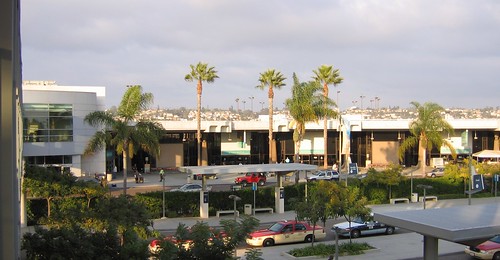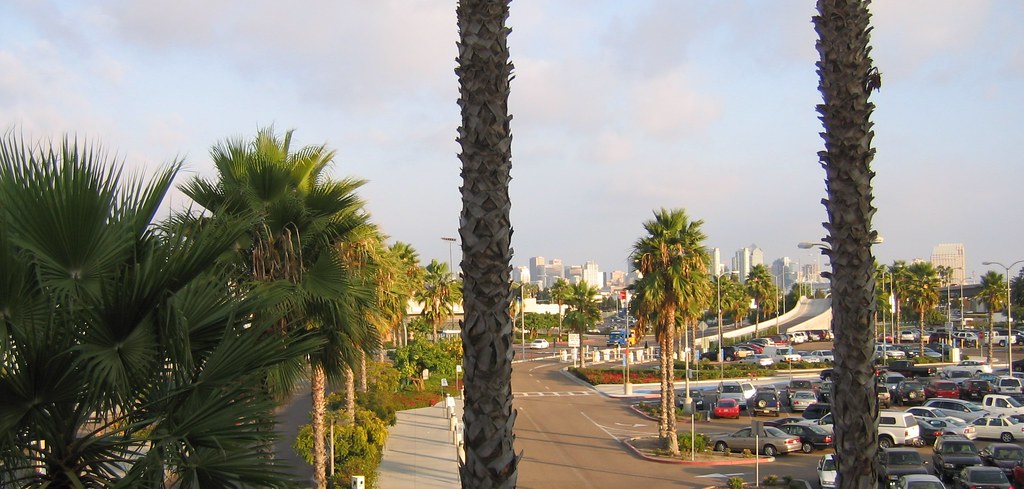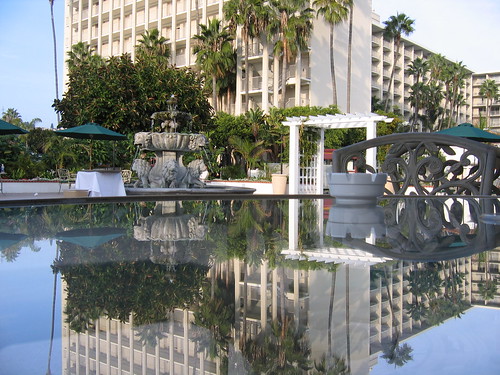San Diego
 What did I find in San Diego ?
What did I find in San Diego ?
Sunny skies and palm trees :
And this pen
I also learned that 'El' and 'La' are the masculine and feminine versions of the word 'the'. So you have 'El Hombre' (the man) .vs. 'La Mesa' (the table). (Incidentally the hindi/urdu word for table मेज ["Maze"] is also feminine as far as I remember. I suspect Arabic is the link language). 'Los' and 'Las' are the plural counterparts of 'El' and 'La'. I knew about 'San' and 'Santa' being the masculine and feminine versions of 'Saint'. We were wondering about 'Santa Cruz', as Cruz sounds like a man's name. It turns out that 'Cruz' means 'Cross' and, for whatever reason, is feminine. Spanish place and street names make a lot more sense now.
 This cover of the San Diego Weekly Reader :
This cover of the San Diego Weekly Reader :
 Yes, it's a Sikh man tying his turban. Here's a closeup.
Yes, it's a Sikh man tying his turban. Here's a closeup.
 that's also a 128MB memory stick.
that's also a 128MB memory stick.
 Did I mention the sun and the palm trees ?
Did I mention the sun and the palm trees ?
 And some talks and posters and stuff.
And some talks and posters and stuff.

12 Comments:
(Incidentally the hindi/urdu word for table मेज ["Maze"] is also feminine as far as I remember.
Actually, I would suspect (if I had to guess) a more direct connection between the words independent of Arabic. It is more likely that "mesa" is distantly derived from latin, and mez from persian or sanskrit. Which would make all languages directly related (latin,persian,sanskrit etc are all indo-european languages, and related, while Arabic is Semitic, and not related)
Sunil ! Thanks for the comment.
Yes, I agree that the Indo-European connection is one possibility but somehow I find my theory more appealing :) I'll explain.
First, my impression is that hindi words that have 'z' in them are generally persian derived. [Correct me if I'm wrong]. And arabic has had a huge influence on Persian so I wouldn't be surprised if Mez is also an arabic word [If my Iranian colleague was around I'd confirm all of this], and my theory is that Mesa and Mez are cousins because of the arabic-spanish nexus.
If it had an Indo-european (i.e. Latin) link would we not expect French also to have a word like Mesa for table ? But according to babelfish Mesa translates in French as 'Table'. So that suggests that the link is not via latin.
It's clear that an amateur linguist with a little knowledge can do a lot of damage. So use this (mis)information at your own peril :)
Palms and sunny-yeah, sunny San Diego. I love La Holla cove and the birds there.....and its also a big West Coast hub for great work in Biological Sciences research and inductry.
Pen with memory stick :). where did you find it. would make a greatr present.
Sorry, La Jolla.
lahoya is what one of my Hispanic friends writes it as :)for quick.
The pen/memory-stick came with the conference. I don't know if they sell it off the shelf. Though it looks kinda cool, I don't think it's that useful. I prefer my memory-sticks to come unattached.
Thanks for the comment shlok. I'm sure your teacher is more knowledgable than me, but I prefer the urdu-arabic-spanish angle myself (for the reason I stated in my previous comment).
The Swahili word for table is also 'Meza' - which is derived from the Portuguese Mesa. Interesting Indian Ocean currents and winds at work!
The Swahili word for table is also 'Meza' - which is derived from the Portuguese Mesa.
But is the Swahili word derived from Arabic or Portuguese ? Isn't Arabic the more likely candidate (because Swahili is a mixture of Arabic and some coastal African languages) ? Interesting none the less.
kameez (hindi) / camisa (spanish) = shirt. There are lots of these.
kameez (hindi) / camisa (spanish)
Nice.
hi. 'mesa' is the spanish for table, as you said, which derives from the latin 'mensa', meaning the same. in fact, in old french, the word for table was 'moise', and only in modern french is it 'table', which comes from the latin 'tabula', meaning tablet or plank. from the other end, the urdu 'mez' derives from persian 'miz'. haven't been able to determine what the arabic for 'table' is, though.
Thanks for the info Feanor. There goes another of my linguistic theories.
Post a Comment
<< Home